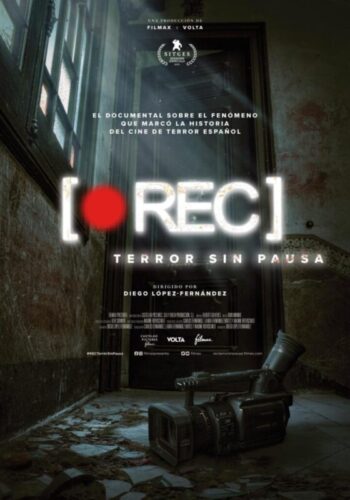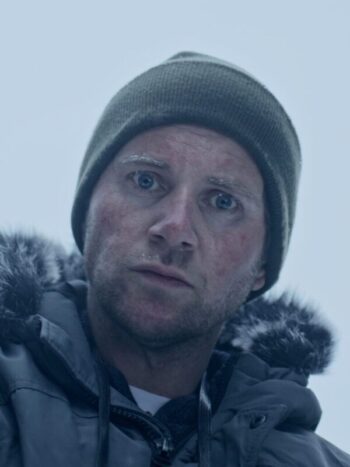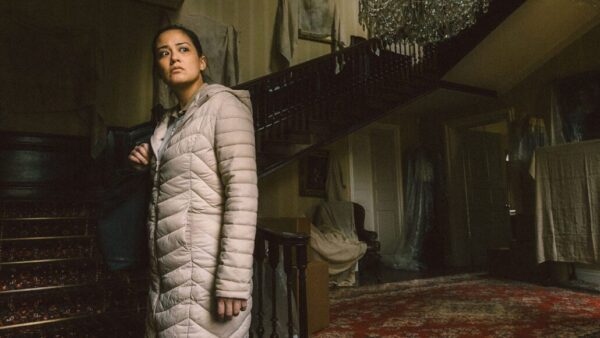Cold Meat, Raging Grace, River, [Rec] Terror Without Pause

FrightFest 2023 continues below. It’s another fine, sunny day in central London, but there’s plenty new movies to see. Unfortunately staying up past my bedtime for Transmission meant I had to miss Liz Hurley comeback vehicle The Piper, which had the thankless task of playing Sunday morning. But refreshed I saunter to the cinema to see…

[REC] TERROR WITHOUT PAUSE
Directed by Diego López-Fernadez
Rec is a modern masterpiece – one of the greatest found footage films of all time and a brilliant take on the zombie subgenre. This documentary features almost everyone involved to give an in-depth look at its genesis, creation, and legacy. Directors Jaume Balaguero and Paco Plaza are delighted to be sat again in the hallway of the now-famous Barcelona building – which still gets visited by numerous fans every year. Perhaps the most interesting part is hearing about how these two intentionally messed with their cast, feeding them contradictory information to make their performances look more natural and confused. Likewise, it was good to learn about the freedom members were offered – even if the improv element is often exaggerated. Star Manuela Velasco, who was also a TV reporter for a decade, interviewed them to develop their parts. They also expand on the importance of the often-underappreciated comedic aspects of the movie – often downplayed when discussing just how darn scary it is. I had also never considered how it sticks to a videogame structure – ascending the tower but stopping for fetch quests such as ‘get keys’ ala Resident Evil. It’s all very informative and cheerful, but the main thing that elevates it above the level of blu ray extra is the reflection on both the importance of Barcelona as a setting for the action and the film’s impact on the Spanish industry. These situate REC in a global cinema context and make a wider statement about why Spain doesn’t have the genre profile of Mexico or Portugal. There are some minor issues with pacing and content – I know the first is widely regarded as the best, but films three and four are almost totally ignored. The translation is also a bit clumsy in places. But if you liked REC and want to know more about it, this is a top notch watch.

COLD MEAT
Directed by Sébastien Drouin
The surprise of the day. This is one of those films that’s easy to say too much about, so I’ll stick to act one. David Petersen is passing through the Colorado Rockies, driving home for Christmas, when he stops at a small diner. After a young waitress’ abusive alcoholic husband comes in to yell at her, he steps in and calmly defuses the situation with a legal threat. Afterward, he heads back into the blizzard, though someone now appears to be tailing him. A tense follows, and though he gets away, a slip means his car gets stuck in the thick snow. The weather outside is frightful, but that may be the least of his worries. This story has a few nice twists, yet it’ll likely be remembered for how much mileage it gets from so little. We’re trapped in the car for 90% of the run time – David attempts to get away on foot and breaks a leg in the process. Only he’s not alone, and after an early turn, Cold Meat becomes a film about two people confined to a single space. Neither wants to be there, but they can’t leave, so they stew in mutual contempt. It’s a classic horror scenario, and I liked how the power dynamic shifted multiple times throughout. Despite one of the characters being seemingly impervious to introspection, the script gives the actors a lot to work with. There’s also a brilliant atmosphere – sheets of snow fall at all times, and the howling winds evoke the spectre of the wendigo that may or may not be outside waiting to feast upon their sins. On that point, I wasn’t entirely convinced by the villain’s motivation, which comes through in slightly forced dialogue – but then, at least they are not just another psychopath impervious to introspection. Good performance and make-up sell the feeling of being in there with them, and that thought is terrifying.

RAGING GRACE
Directed by Paris Zarcilla
I was saying the other day that horror is often at its best when it’s about people on the fringes of society. This (terribly named but brilliant) movie follows the all too real story of a struggling undocumented Filipina immigrant, Joy, struggling for money and a path to UK citizenship. She and her daughter Grace have no permanent residency, spending nights in the places she works as a cleaner as the owners holiday. As such, she’s delighted when a live-in job comes up taking care of an extremely wealthy but terminally ill old man. The pay is better than she’s had before, and while Grace will be relegated to a wardrobe, at least it’s a roof. It almost seems too good to be true, and spoiler alert – it is. The owner’s snobby and racist niece Katherine, who is a never-ending stream of patronising microaggressions, may or may not be trying to kill her comatose relative for inheritance.
Something I wasn’t expecting, considering the subject matter, was how funny this film is. Actors Max Eigenmann and Jaeden Paige Boadilla have superb comic timing, completely selling their roles as mother and daughter, respectively. There are so many scenes of peril as we wonder how long they can keep their ruse from others, and I loved seeing the chronically bored Grace try to find fun in any situation. Her refusal to accept her mother being treated as subordinate and the precarious life they lead daily is heartening but anxiety-inducing as her rebellious noise risks blowing their cover. The humour adds to the suspense immensely, making us feel like we’re in on a caper without detracting from the stakes – that for Joy and Grace, if they’re found out they risk detention or even deportation. There’s also a deep anger, festering barely beneath the surface of this film, at Britain today. The scapegoating and mistreatment of the vulnerable citizens the country relies upon is best captured in an impassioned monologue about gratitude. On this last point, a couple of lines prompted an ‘ooooo’ from the cinema audience – Raging Grace wants these uncomfortable conversations.
Its horror is arguably less successful than its satire, sometimes overstepping the line from modern trauma flicks into Hammeresque hysteria. There are hints of the supernatural from an early stage – something teased throughout – but Raging Grace is more concerned with the evils of this world – exploitation, discrimination, and the legacy of colonialism. Yet it still uses the visual language of a conventional gothic horror film but cannot quite deliver on that front. Some of the developments in the third act felt hollow and rushed, and I disliked the reliance on convenient plot mechanics such as sleepwalking. Still, it won me back with a brilliant and poignant finale. After everything that’d happened in the film, the closing minutes are my absolute highlight of FrightFest this year, and as I edit this the morning after, the mere thought of them makes me want to well up. I hope this gets a big release. As young star Boadilla used the screening to dedicate the movie to single parents everywhere, she captured the spirit of the film and the festival at once.

RIVER
Directed by Junta Yamaguchi
Remember how good Beyond The Infinite Two Minutes was? Well, director Junta Yamaguchi is back with a similar movie about making the most of life and recognising the beauty in its small moments. At the Japanese Fujiya Inn, nested in the mountains of Kibune, Kyoto, the staff and guests are unexpectedly thrown into a time loop where everything reverts to how it was two minutes before – their consciousness carries over, but they find themselves back in the same spot. What follows is a real-time film of numerous restarts. Some want to leave immediately, being horrified at the prospect of reliving the same 120 seconds. Yet, others cherish being temporarily stuck in a moment where they’re sitting eating endless food with a close friend or escaping the threat of an impending deadline. And, in its darker moments, experiencing the feeling of death. The common thread is that they all have unresolved issues, and the contemplative nature of the film gives them plenty of time to stop what they’re doing and reflect on their lives. Seeing the inn prioritise 5-star service amid the confusion and folks teaming up to work out practicalities, such as finding the easiest place for the most people to congregate, is enjoyable. I was also glad most were smart enough to follow the premise. Hence, we avoid spending the first 20 minutes repeatedly explaining the story – though it derives some humour out of infuriating interruptions. While it’s ostensibly an ensemble, the hopeless romantic waitress Mikoto emerges as our lead – her doomed love for a soon-to-leave co-worker who becomes the film’s heart. The loop may be a blessing that protects her change and the pain of an uncertain future without him. Like Beyond The Infinite Two Minutes, we have impressive single-take scenes from super mobile cameras, seeing all aspects of the inn. It’s a beautiful location, and Yamaguchi quickly establishes its geography and just how far each person can walk or run in the time. It’s a shame to leave, but as the characters gradually realise, you can have too much of a good thing. A brilliant, contemplative follow-up that’s less scrappy, more meditative, and similarly funny. Highly recommended.







Be the first to comment